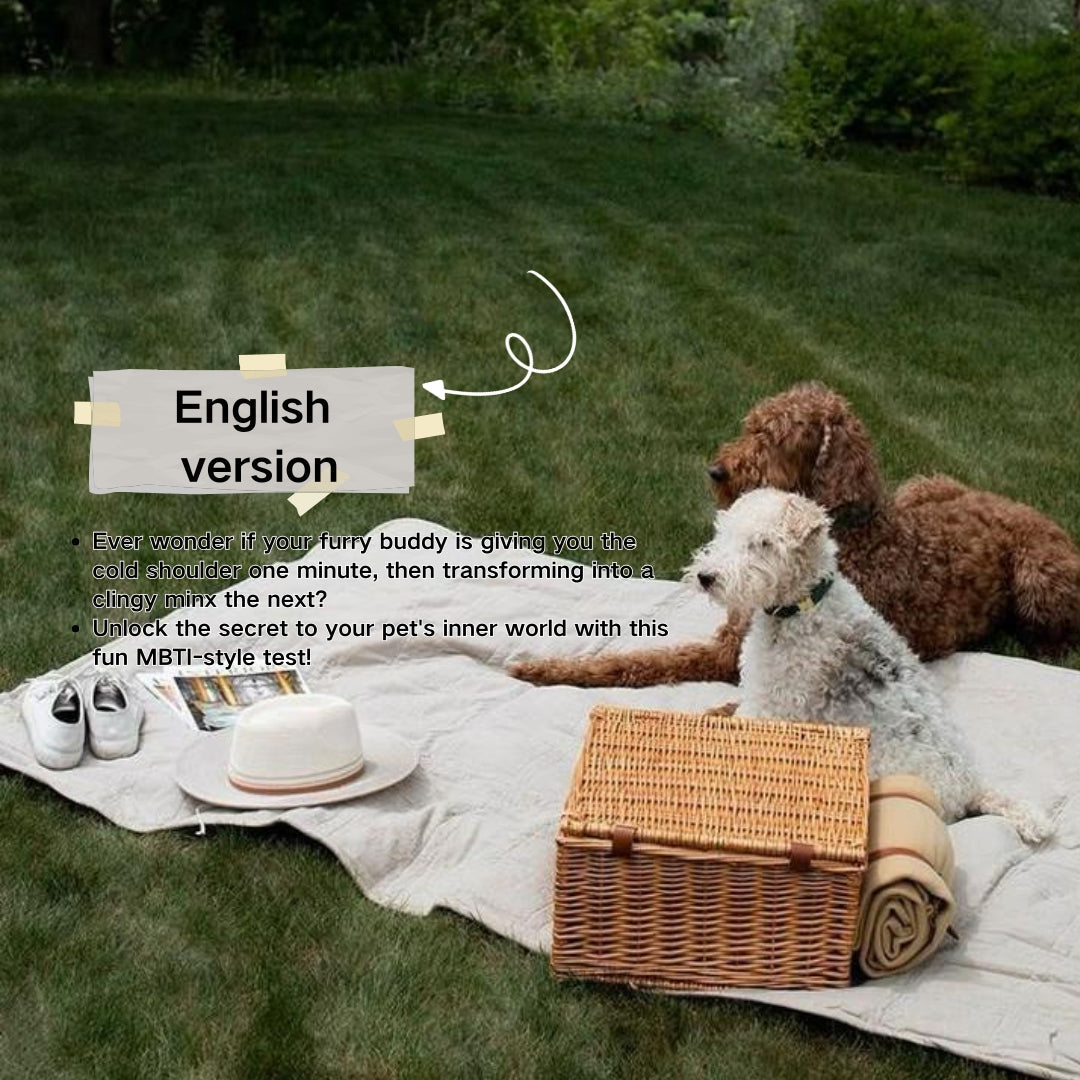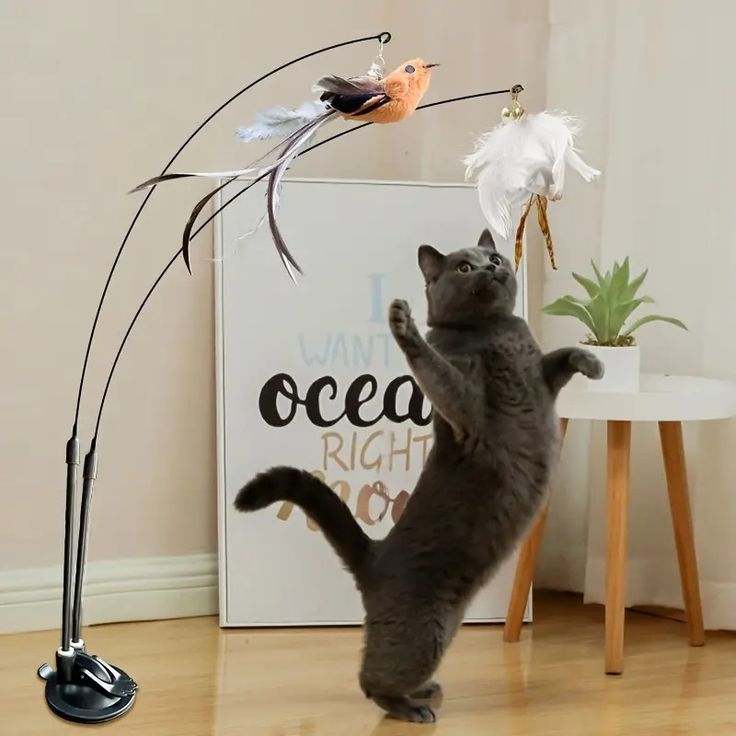
🐾 Pet Personality Test: Discover Your Pet's MBTI Type!
Share
Ever wonder why your pet sometimes acts like a distant aristocrat and other times clings to you like a shadow? Are they a social butterfly or a lone wolf? Curious explorer or laid-back observer?
Take this fun MBTI-inspired quiz to uncover your pet's unique personality type!

How to Play
Answer the 24 questions below based on your pet's typical behavior. Each question has two options: choose the one that best describes your pet.
At the end, tally up the letters corresponding to your choices in each of the four MBTI dimensions:
-
E (Extraversion) / I (Introversion)
-
S (Sensing) / N (Intuition)
-
T (Thinking) / F (Feeling)
-
J (Judging) / P (Perceiving)
The combination of these letters reveals your pet's MBTI type!

The Questions
-
Your pet prefers:
-
A. Playing with you or other animals, enjoying interaction. (E)
-
B. Exploring corners alone or resting quietly. (I)
-
-
When encountering something new:
-
A. Immediately sniffs or bites it, full of curiosity. (N)
-
B. Observes first, then approaches cautiously. (S)
-
-
Around other animals, your pet:
-
A. Approaches to make friends or play. (F)
-
B. Stays alert, possibly showing competitive behavior. (T)
-
-
Daily routine:
-
A. Acts on impulse—plays or sleeps as desired. (P)
-
B. Follows a set schedule for meals and rest. (J)
-
-
Response to your call:
-
A. Runs over immediately, wagging tail or rubbing against you. (E)
-
B. Occasionally responds; often remains still. (I)
-
-
Favorite resting spot:
-
A. Sunny windowsill or couch, enjoying leisure time. (S)
-
B. High or hidden places, overseeing the room. (N)
-
-
Attitude toward food:
-
A. Gets excited and eats immediately. (F)
-
B. Sniffs carefully before eating. (T)
-
-
Reaction to new toys:
-
A. Excitedly jumps in to play. (P)
-
B. Observes before deciding to play. (J)
-
-
Response to strangers:
-
A. Approaches to interact. (E)
-
B. Watches from a distance until feeling safe. (I)
-
-
Preferred games:
-
A. Chasing, jumping—games requiring thought. (N)
-
B. Simple fetch or chew toys—repetitive games. (S)
-
-
After misbehaving:
-
A. Acts cute to win your forgiveness. (F)
-
B. Hides or pretends nothing happened. (T)
-
-
Reaction to environmental changes:
-
A. Quickly adapts, curious about new surroundings. (P)
-
B. Needs time to adjust, may feel uneasy. (J)
-
-
Preferred companionship:
-
A. Playing and interacting with you. (E)
-
B. Quietly staying near you without much interaction. (I)
-
-
Response to sounds:
-
A. Curious about all sounds, investigates immediately. (N)
-
B. Reacts only to familiar sounds (like food bags). (S)
-
-
Attitude toward other pets:
-
A. Tries to comfort or care for them. (F)
-
B. Shows competitiveness, may guard food or toys. (T)
-
-
Approach to daily activities:
-
A. Enjoys trying new things, dislikes monotony. (P)
-
B. Prefers fixed activities, like scheduled walks. (J)
-
-
Behavior outdoors:
-
A. Excitedly explores new environments. (E)
-
B. Stays close to you, hesitant to wander far. (I)
-
-
Toy preference:
-
A. Complex toys requiring problem-solving or interaction. (N)
-
B. Simple toys like balls or ropes. (S)
-
-
Response to your emotions:
-
A. Sensitive to your feelings, tries to comfort you. (F)
-
B. Unaffected by your mood, continues own activities. (T)
-
-
Attitude toward routines:
-
A. Prefers spontaneity, dislikes fixed schedules. (P)
-
B. Enjoys regular routines like set meal times. (J)
-
-
In unfamiliar environments:
-
A. Eagerly explores and adapts quickly. (E)
-
B. Feels anxious, takes time to relax. (I)
-
-
Response to training:
-
A. Enjoys learning new skills, is interested in complex commands. (N)
-
B. Prefers simple commands, finds repetition boring. (S)
-
-
Reaction to discipline:
-
A. Appears remorseful or seeks to appease you. (F)
-
B. Unfazed, continues desired behavior. (T)
-
-
Attitude toward household arrangement:
-
A. Likes to scatter things, enjoys freedom. (P)
-
B. Prefers items in fixed places, maintains tidiness. (J)
-

Calculating Your Results
Count the Options: Tally the number of A and B choices for each dimension:
- E (Extroverted) vs. I (Introverted)
- S (Sensing) vs. N (Intuitive)
- T (Thinking) vs. F (Feeling)
- P (Perceiving) vs. J (Judging)
Identify the Tendency: For each dimension, the letter with the higher count indicates your pet's preference.
Find Their MBTI: Combine the four letters to find your pet's unique MBTI personality type!

Understanding Your Pet's MBTI Personality Type
Extroverted (E) Types:
-
ENTP - The Explorer
- Characteristics: Energetic, quick-witted, creative, and imaginative. Adores interacting with people or pets, and enjoys expressing themselves.
- Behavior: Often invents new games or mischief, masters new environments quickly, always finds novel fun.
- Interaction Style: Loves your attention and playtime! Craves interactive sessions full of surprises and engagement.
-
ENFP - The Joybringer
- Characteristics: Vibrant, upbeat, endlessly curious and explorative. Thrives on novelty and zest for life.
- Behavior: Zooming to investigate anything new, radiating boundless energy throughout the day.
- Interaction Style: Actively seeks your play and adventures. Eats up your praise and gets extra hyper with encouragement.
-
ESTP - The Action Hero
- Characteristics: Bold, courageous, adventure-loving. Adapts like a champ to changing situations.
- Behavior: Gets excited by challenging games, conquers new places swiftly, and seeks out thrills.
- Interaction Style: Thrives on interactive chaos (like crazy games). Needs freedom to unleash their inner daredevil.
-
ESFP - The Life of the Party
- Characteristics: Outgoing, enthusiastic, born entertainers and attention-lovers. Masters at sniffing out fun.
- Behavior: Shows off charming antics (rolls, jumps!) to grab your eye. The resident expert at cracking you up.
- Interaction Style: Demands your attention and applause. Delights in playing or performing hilarious acts with you for mutual joy.
-
ENTJ - The Commander
- Characteristics: Confident, decisive, natural-born leader with a need to control territory/possessions.
- Behavior: Tries to boss other pets around, fiercely protects favored spots/items.
- Interaction Style: Demands respect for their role. May direct play their way or request affection on their terms.
-
ENFJ - The Charmer
- Characteristics: Warm, super social, expert networkers. Radiates constant positivity.
- Behavior: Greets people and guests eagerly. Always ready for household fun and social buzz.
- Interaction Style: Adores close cuddle sessions. Uses sweetness or adorable tricks to capture your affection and approval.
-
ESTJ - The Organizer
- Characteristics: Orderly, disciplined masters of organization. Strong decision-makers focused on reality and efficiency.
- Behavior: Shows authority around other pets. Values order in their stuff and space.
- Interaction Style: Appreciates clear rules and directions. Complies reliably, but might side-eye you if you mess up their order.
-
ESFJ - The Little Comforter
- Characteristics: Hospitable, friendly, social butterflies. Kind-hearted and caring towards others.
- Behavior: Enthusiastically interacts with guests and other pets. Thrives in social events.
- Interaction Style: Cherishes closeness with you and others (cuddles!). Performs cute tricks seeking love, validation, and being the center of warmth.
Introverted (I) Types:
-
INTP - The Thinker
- Characteristics: Deeply curious knowledge-seekers. Love pondering and analyzing problems with sharp logic.
- Behavior: Fascinated by new toys/phenomena, studies them intently. Daily life is happily unstructured.
- Interaction Style: Values independence, doesn't always seek you out. Engages deeply if you join their intellectual explorations.
-
INFP - The Dreamer
- Characteristics: Gentle, kind, deeply empathetic. Avoids conflict and seeks peace.
- Behavior: Peaceful and tolerant with other pets. Shows special concern for the vulnerable.
- Interaction Style: Prefers gentle affection. Escapes silently rather than confront things they dislike.
-
ISTP - The Solo Specialist
- Characteristics: Cool-headed, observant analysts. Prefers quiet problem-solving alone.
- Behavior: Watches situations thoughtfully before acting. Genius at quick fixes for complex problems.
- Interaction Style: Low-key in interactions; doesn't demand attention. Offers quiet, steadfast support when you genuinely need it.
-
ISFP - The Artist
- Characteristics: Easygoing, freedom-loving spirits. Drawn to beauty and expressing creativity.
- Behavior: Stops to admire pretty things or interesting scenes. Rejects rigid schedules.
- Interaction Style: Chills with you naturally on their own terms. Happiest with space and freedom to be themselves.
-
INTJ - The Strategist
- Characteristics: Intelligent, independent thinkers with strong opinions and plans. Expert observers and analyzers.
- Behavior: Spends time observing or exploring quietly. Has unique ways of playing with toys.
- Interaction Style: Interaction is selective. When they initiate, it shows deep trust (maybe a special meow or head-butt to convey needs).
-
INFJ - The Heart Listener
- Characteristics: Emotionally intuitive and sensitive, tuned into you and their surroundings. Rich inner world and ideals.
- Behavior: Silently supports you when you're down. Becomes intensely focused on beloved activities.
- Interaction Style: Forms a profound bond. Expresses love subtly – a soft touch, a soulful look.
-
ISTJ - The Guardian of Order
- Characteristics: Reliable, steady champions of routine. Responsible and dutiful.
- Behavior: Lives by a schedule for meals/sleep. Keeps their areas organized.
- Interaction Style: Steadfastly reliable. Follows your cues without dramatic fuss, showing loyalty through quiet presence.
-
ISFJ - The Little Security Blanket
- Characteristics: Deeply loyal, dependable, deeply attached to home and you. Strong protective instincts.
- Behavior: Constantly vigilant over home safety, wary of strangers. Stays near your usual spots.
- Interaction Style: Craves close contact (snuggles, pets!). Highly attuned to your moods and tries hard to soothe you.


